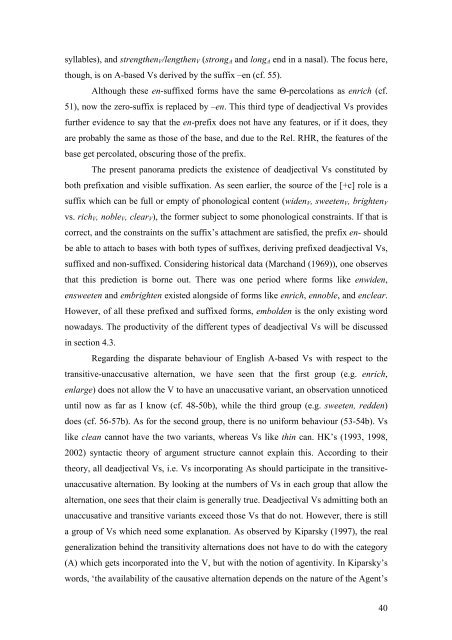Prefixation in English and Catalan - Departament de Filologia ...
Prefixation in English and Catalan - Departament de Filologia ...
Prefixation in English and Catalan - Departament de Filologia ...
Create successful ePaper yourself
Turn your PDF publications into a flip-book with our unique Google optimized e-Paper software.
syllables), <strong>and</strong> strengthenV/lengthenV (strongA <strong>and</strong> longA end <strong>in</strong> a nasal). The focus here,<br />
though, is on A-based Vs <strong>de</strong>rived by the suffix –en (cf. 55).<br />
Although these en-suffixed forms have the same Θ-percolations as enrich (cf.<br />
51), now the zero-suffix is replaced by –en. This third type of <strong>de</strong>adjectival Vs provi<strong>de</strong>s<br />
further evi<strong>de</strong>nce to say that the en-prefix does not have any features, or if it does, they<br />
are probably the same as those of the base, <strong>and</strong> due to the Rel. RHR, the features of the<br />
base get percolated, obscur<strong>in</strong>g those of the prefix.<br />
The present panorama predicts the existence of <strong>de</strong>adjectival Vs constituted by<br />
both prefixation <strong>and</strong> visible suffixation. As seen earlier, the source of the [+c] role is a<br />
suffix which can be full or empty of phonological content (wi<strong>de</strong>nV, sweetenV, brightenV<br />
vs. richV, nobleV, clearV), the former subject to some phonological constra<strong>in</strong>ts. If that is<br />
correct, <strong>and</strong> the constra<strong>in</strong>ts on the suffix’s attachment are satisfied, the prefix en- should<br />
be able to attach to bases with both types of suffixes, <strong>de</strong>riv<strong>in</strong>g prefixed <strong>de</strong>adjectival Vs,<br />
suffixed <strong>and</strong> non-suffixed. Consi<strong>de</strong>r<strong>in</strong>g historical data (March<strong>and</strong> (1969)), one observes<br />
that this prediction is borne out. There was one period where forms like enwi<strong>de</strong>n,<br />
ensweeten <strong>and</strong> embrighten existed alongsi<strong>de</strong> of forms like enrich, ennoble, <strong>and</strong> enclear.<br />
However, of all these prefixed <strong>and</strong> suffixed forms, embol<strong>de</strong>n is the only exist<strong>in</strong>g word<br />
nowadays. The productivity of the different types of <strong>de</strong>adjectival Vs will be discussed<br />
<strong>in</strong> section 4.3.<br />
Regard<strong>in</strong>g the disparate behaviour of <strong>English</strong> A-based Vs with respect to the<br />
transitive-unaccusative alternation, we have seen that the first group (e.g. enrich,<br />
enlarge) does not allow the V to have an unaccusative variant, an observation unnoticed<br />
until now as far as I know (cf. 48-50b), while the third group (e.g. sweeten, red<strong>de</strong>n)<br />
does (cf. 56-57b). As for the second group, there is no uniform behaviour (53-54b). Vs<br />
like clean cannot have the two variants, whereas Vs like th<strong>in</strong> can. HK’s (1993, 1998,<br />
2002) syntactic theory of argument structure cannot expla<strong>in</strong> this. Accord<strong>in</strong>g to their<br />
theory, all <strong>de</strong>adjectival Vs, i.e. Vs <strong>in</strong>corporat<strong>in</strong>g As should participate <strong>in</strong> the transitiveunaccusative<br />
alternation. By look<strong>in</strong>g at the numbers of Vs <strong>in</strong> each group that allow the<br />
alternation, one sees that their claim is generally true. Deadjectival Vs admitt<strong>in</strong>g both an<br />
unaccusative <strong>and</strong> transitive variants exceed those Vs that do not. However, there is still<br />
a group of Vs which need some explanation. As observed by Kiparsky (1997), the real<br />
generalization beh<strong>in</strong>d the transitivity alternations does not have to do with the category<br />
(A) which gets <strong>in</strong>corporated <strong>in</strong>to the V, but with the notion of agentivity. In Kiparsky’s<br />
words, ‘the availability of the causative alternation <strong>de</strong>pends on the nature of the Agent’s<br />
40
















